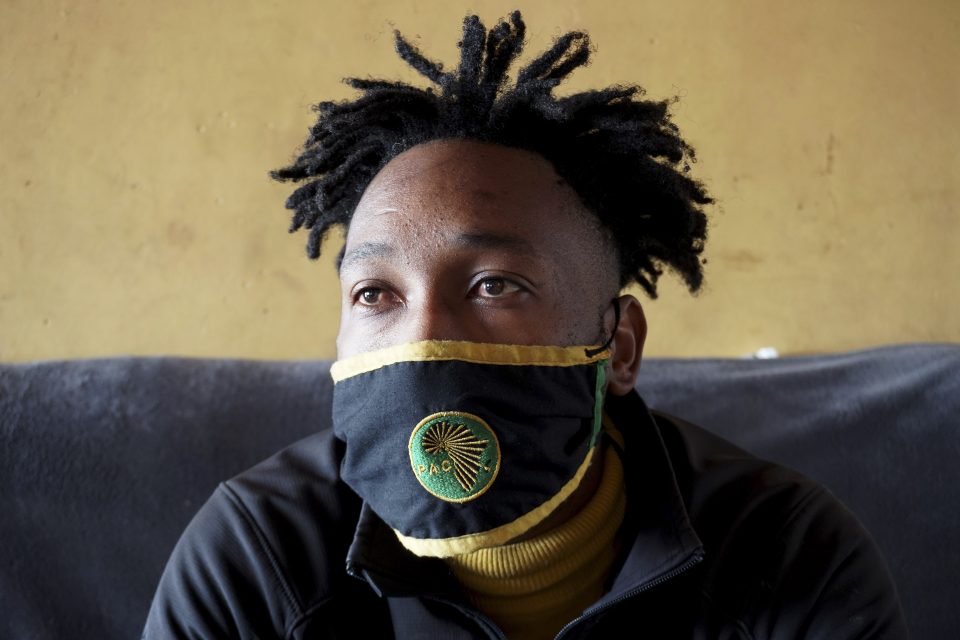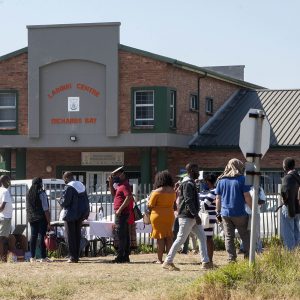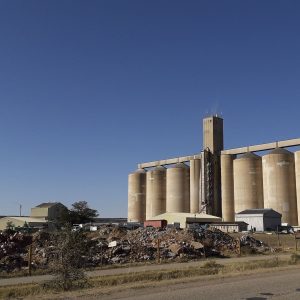Worker fired over sick leave for Covid-19 anxiety
In this fourth instalment in a series on the coronavirus and capitalism, New Frame reveals how a worker’s anxiety over positive cases in his workplace led to his dismissal.
Author:
20 August 2020

The summons to a disciplinary hearing came as an unpleasant surprise to Sibahle Runeli, 32, who is the breadwinner in his family of four. A warehouse worker at dairy giant Clover’s factory in Perseverance, Port Elizabeth, Runeli was accused by three managers of “serious misconduct”.
This was because he had told his doctor in a confidential consultation months earlier that he was feeling stressed because a colleague was known to have tested positive for the coronavirus and a group of other workers had been sent home to self-isolate. Nobody knew how many of those workers were positive. Runeli’s doctor diagnosed him with tension headaches and anxiety and placed him on sick leave for 14 days. After the sick leave period was over, Runeli returned to work for several weeks until Clover suddenly decided to discipline him.
“It is alleged that you displayed unacceptable behaviour and serious misconduct in that you acted in a dishonest manner in that you lied to [the doctor] on the 4th of May 2020 about the number of positive Covid-19 cases at the Clover Port Elizabeth branch as well as the branch’s alleged failure to follow company protocol in this regard,” the company wrote in a letter to Runeli, before firing him after the disciplinary hearing.
Part one:
But Runeli says he did not claim that there were a specific number of Covid-19 cases at the plant, because Clover’s management had not disclosed to the staff how many cases there were. He only told his doctor that he was anxious because one colleague had tested positive, that others had been sent home to self-isolate and that there was no transparency from management about the number of cases, nor proper disinfection of his workplace.
At the disciplinary hearing, Runeli says, the company’s nurse confirmed that one employee had tested positive, 11 more had been tested but their results were negative and that 96 workers had been told to self-isolate for 14 days. This was the first time Runeli heard this information, which had not been given to the workers at the time.
‘Untruthful’ information
Asked why the company would want to bar employees from discussing Covid-19 cases in the workplace with their private doctors, Clover spokesperson Louise Fortuin would only say that “the disciplinary process initiated is not as a result of the employee informing his doctor about a Covid-19 infection at the facility, but rather that the information supplied was untruthful”.
In a recording of the disciplinary hearing, a manager can be heard shouting at Runeli: “You took that information you were not sure of and you went to the doctor! You took something that you heard in the locker room and went to your doctor. How can you use it [a rumour] as a reason for being anxious?”
Runeli says there are no health and safety procedures displayed at Clover that tell workers what to do when they or their colleagues are infected or potentially infected. But Jacques van Heerden, a supply chain and distribution executive at Clover, says the company does have such procedures. He would not share them with New Frame, however, as they are “internal documents”. He says Clover employees do not have a copy of the procedures because they have been communicated verbally.
Part Two:
“The procedures are continuously reinforced via regular updates and reminders from team leaders as the pandemic evolves, as well as through company training programmes, notice boards and posters visible across the facility,” said Van Heerden.
However, the Clover posters sent to New Frame provide little guidance for employees other than that they should inform their team leader if they experience Covid-19 symptoms, see a doctor and place themselves in quarantine if they feel sick.
Runeli has filed a case of unfair dismissal at the Commission for Conciliation, Mediation and Arbitration and the case will be heard on 28 August. He says his case “shows that the only thing Clover is worried about is costs, profits and keeping production going”.
Mametlwe Sebei, the president of the General Industries Workers Union of South Africa, says workers will be left without support from their employers during the pandemic if individual bosses remove their constitutional right to freedom of expression. “In the current period, the right to freedom of expression will be meaningless if it doesn’t include legitimate expression of genuine fears of the workers about workplace safety and health and sharing those fears with trade unions, professionals and any person who can help in any way.”
Violating confidentiality
It emerged in the hearing that Runeli’s doctor had written a detailed letter disclosing his discussion with his patient. Sebei says this is a violation of doctor-patient confidentiality.
Priscilla Sekhonyana, the communications manager at the Health Professions Council of South Africa, agrees. “It is not ethical. Patients have a right to expect that information about them will be held in confidence by healthcare practitioners. Confidentiality is central to trust between practitioners and patients.”
Sekhonyana says if anyone, including an employer, asks doctors to provide information about their patients, the consent of the patient must first be sought. “Healthcare practitioners must obtain express consent where patients may be personally affected by the disclosure, meaning the practitioner was supposed to have informed the patient that he/she was going to disclose.”

Pierre de Vos, head of the University of Cape Town’s department of public law and the Claude Leon Foundation chairperson in constitutional governance, says no employee should be barred by their employer from telling anyone about Covid-19 cases in the workplace.
He says this would be a “very serious infringement … on the right to freedom of expression, particularly Section 16(1)(b), which guarantees for everyone the freedom to receive or impart information or ideas. Both the rights of the employee to impart information and the rights of members of the public to receive information are being infringed.”
De Vos added: “Access to information on whether there are active Covid-19 cases at a company, government office or school will empower individuals to make choices that can literally mean the difference between life and death. While individual Covid-19 patients have a right to privacy, a company, government office or school does not. Moreover, the impulse to hide information during a pandemic in a situation that may endanger the lives of the public has a troubling authoritarian smell to it.”
Sharing and withholding information
Neil Matthys, a health and safety practitioner who is trained in Covid-19 management in the workplace, says managers “must remember that Covid-19 is still an unknown pandemic”.
“It is therefore normal for people in general to be anxious. To offset this anxiety, workplaces must develop regular information sessions and share ownership of roles and responsibilities. This is a great opportunity for workplaces to develop leadership from the floor,” Matthys said.
But the Germiston-based Casual Workers Advice Office (CWAO) says developing such leadership is the last thing on employers’ minds, particularly in factories. Many factory workers are being fed half-truths by their bosses about coronavirus outbreaks at work and “are unable to make their own informed decision on whether to take the risk of going to work or not”, says media and education officer Lynford Dor.
“When workers have refused to work in light of clear-cut Covid-19 outbreaks, employers have turned towards disciplinary action, suspensions and dismissals to create an environment of fear so that the majority of workers are forced back into the factories,” he said.
Part Three:
A big problem is the government’s regulations on Covid-19 health and safety measures at work, says Dor, because when there is an outbreak of the coronavirus in the workplace, they “leave it up to the employer to decide who must go into quarantine and who can continue working”.
The CWAO has found that employers choose which workers to quarantine on the basis of ensuring that production continues as smoothly as possible. Often, workers who have likely been exposed to Covid-19 by colleagues are not the ones sent for testing, quarantine or isolation if they are needed on the production line. “The regulations also don’t oblige employers to share the details of Covid-19 outbreaks with workers,” said Dor.



